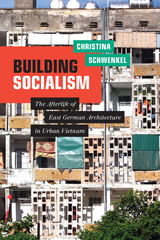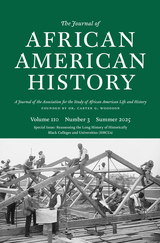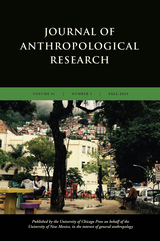2 books about Schwenkel, Christina

Building Socialism
The Afterlife of East German Architecture in Urban Vietnam
Christina Schwenkel
Duke University Press, 2020
Following a decade of U.S. bombing campaigns that obliterated northern Vietnam, East Germany helped Vietnam rebuild in an act of socialist solidarity. In Building Socialism Christina Schwenkel examines the utopian visions of an expert group of Vietnamese and East German urban planners who sought to transform the devastated industrial town of Vinh into a model socialist city. Drawing on archival and ethnographic research in Vietnam and Germany with architects, engineers, construction workers, and tenants in Vinh’s mass housing complex, Schwenkel explores the material and affective dimensions of urban possibility and the quick fall of Vinh’s new built environment into unplanned obsolescence. She analyzes the tensions between aspirational infrastructure and postwar uncertainty to show how design models and practices that circulated between the socialist North and the decolonizing South underwent significant modification to accommodate alternative cultural logics and ideas about urban futurity. By documenting the building of Vietnam’s first planned city and its aftermath of decay and repurposing, Schwenkel argues that underlying the ambivalent and often unpredictable responses to modernist architectural forms were anxieties about modernity and the future of socialism itself.
[more]

Neoliberalism in Vietnam, Volume 20
Ann M. Leshkowich and Christina Schwenkel
Duke University Press
Like China, Vietnam has one of the world’s fastest growing economies on account of its hybridized "market socialism" that combines elements of its official socialist system with free market capitalism. This special issue examines Vietnam’s current social and economic improvisations as situated in specific local and historical experiences. These essays address the complexities and multiplicities of neoliberal reform agendas, demonstrating that socialist and neoliberal regimes are neither exclusive nor distinct.
Contributors draw their conclusions from ethnographic fieldwork in contemporary urban spaces. They link neoliberalism in Vietnam to a set of globally diverse technical practices, institutions, modes of power, and governing strategies; for example, in its shifting currency regimes and its anticorruption campaigns. Contributors also explore the growing emphasis on self-improvement and modernization through studies of architecture, changing beauty standards, and the impact of in vitro fertilization. Biopolitical logics and the self-regulation of moral personhood are also addressed in essays on HIV/AIDS and transnational adoption. The issue highlights the ways in which the socialist past is integral to the present in Vietnam, even as it is remade and newly configured.
Contributors draw their conclusions from ethnographic fieldwork in contemporary urban spaces. They link neoliberalism in Vietnam to a set of globally diverse technical practices, institutions, modes of power, and governing strategies; for example, in its shifting currency regimes and its anticorruption campaigns. Contributors also explore the growing emphasis on self-improvement and modernization through studies of architecture, changing beauty standards, and the impact of in vitro fertilization. Biopolitical logics and the self-regulation of moral personhood are also addressed in essays on HIV/AIDS and transnational adoption. The issue highlights the ways in which the socialist past is integral to the present in Vietnam, even as it is remade and newly configured.
Contributors: Erik Harms, Nina Hien, Ann Marie Leshkowich, Li Zhang, Ken MacLean, Alfred John Montoya, Melissa J. Pashigian, Christina Schwenkel, Allison Truitt
Guest editors: Christina Schwenkel (Associate Professor, Department of Anthropology, University of California at Riverside) and Ann Marie Leshkowich (Associate Professor and Chair, Department of Sociology and Anthropology, College of the Holy Cross).
[more]
READERS
Browse our collection.
PUBLISHERS
See BiblioVault's publisher services.
STUDENT SERVICES
Files for college accessibility offices.
UChicago Accessibility Resources
home | accessibility | search | about | contact us
BiblioVault ® 2001 - 2025
The University of Chicago Press









